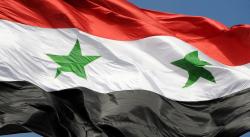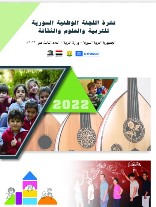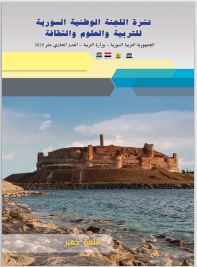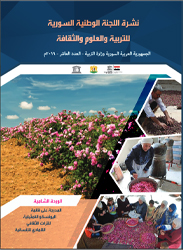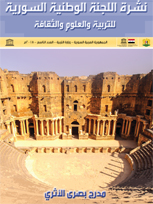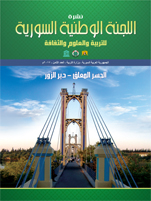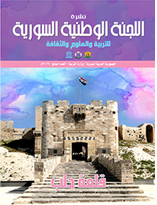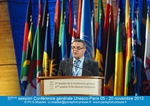A Webinar for the Knowledge Exchange among the Arab Countries Concerning Distance Education Programs by Using Television and Radio.
|
The Syrian Arab Republic, represented by:
Dr. Riyadh Tayfour / Deputy Minister of Higher Education and Scientific Research for Student Affairs /. Dr. Khalil Ajami / President of the Virtual University in the Ministry of Higher Education and Scientific Research /. In the webinar which was organized by the UNESCO Regional Bureau for Education in the Arab Countries - Beirut in cooperation with the Department of Policies and Lifelong Learning Systems in UNESCO - Paris, the European Broadcasting Union and the Arab States Broadcasting Union for the knowledge exchange among the Arab countries concerning remote education programs using television and radio on July 21st, 2020; with the aim of facilitating the exchange of knowledge and good practices in developing audio-visual educational subjects, addressing challenges and opportunities in using television and radio for remote education, and enhancing cooperation among educational content developers and the experts in the field of audio-visual resources. Among the most important topics covered by the webinar: • The problems are related to remote education through television and radio: How can audio-visual educational programmes be developed and implemented? What are the capabilities needed? What is the role of teachers, media professionals, and concerned authorities in supporting the education based on television and radio? What are the challenges that need to be overcome? What are the expected learning outcomes and how can they be measured and monitored? • The use of the television / radio in the context of the continuity of remote education during the Corona pandemic with focusing on Arab countries. UNESCO conducted a study about those countries that use television / radio as a means of remote educating. It showed that 92 countries have television or radio educational programs, and 10% of them are in the Arab countries. The study results showed that 11 out of 13 Arab countries use television, and only 3 countries use radio. • Discussing the lessons learned from education using television / radio, the most important of which are: cooperation among all partners; the importance of innovation to attract students, for example by hosting celebrities and influencers who attract students to join or watch these programs; working to improve existing resources and developing remote educational programs even after the crisis ends. • The situation of distant-education in the Arab region during the Corona pandemic, where the use of radio and television broadcasting is considered as a solution for remote education, and it is a powerful way to bridge the digital gap in the education sector and reaching the most marginalized learners in the Arab countries. According to a study conducted by UNESCO about the impact of distant-education in the Arab world, the television and the radio broadcasting came in the second place, as a way to ensure access to educational subjects during the Corona pandemic. • Recommendations to improve the quality of education using television and radio are ensuring the quality of educational programmes, motivating learners, especially the young ones, allocating learning programs for life skills and supporting children and families emotionally and socially, adopting various types of live and recorded broadcasting and developing partnerships with the telecommunications sector. • The importance of building constructive partnerships between the private and the public sectors to ensure the quality of remote education. • Presentations of Arab experiences in the field of remote education through radio and television. The webinar was concluded with the remarks of the two leaders: Dr. Hejazi Ibrahim Idris / Basic Education Programmes, Specialist at the UNESCO Regional Bureau for Education in the Arab Countries in Beirut, and Guang Chul Chang, Director of Policies and Lifelong Learning Systems at UNESCO Headquarters in Paris. They praised the efforts exerted by the Arab countries to ensure the continuity of education and its quality. They stressed the role of public-private sectors partnerships, referring to the success story represented in this regard by the Global Education Alliance launched by UNESCO at the beginning of the Corona crisis. |











